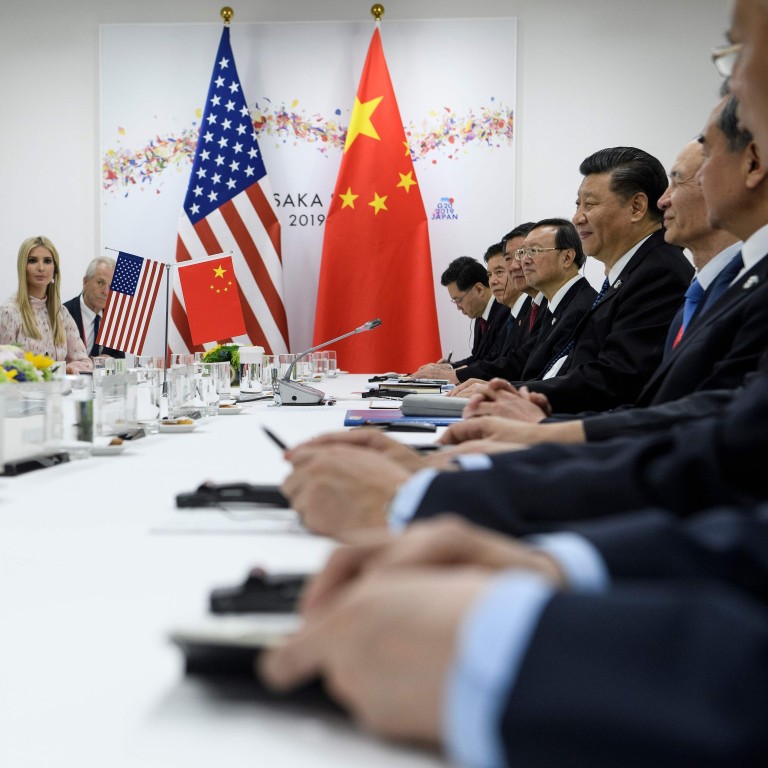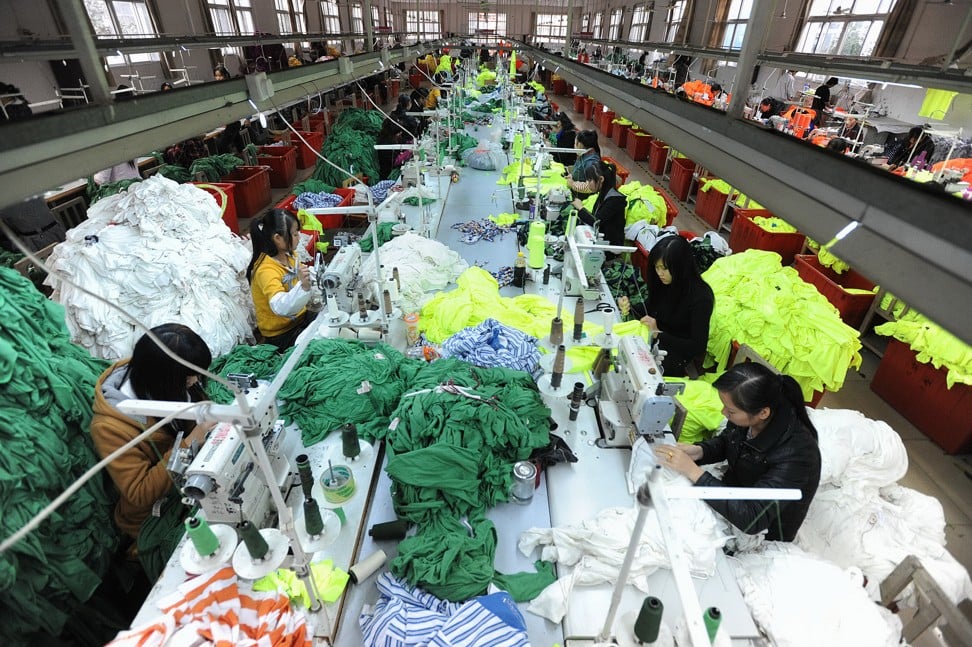
US-China trade truce increases pressure at home for both Trump, Xi to cut a deal, analysts say
- US President Donald Trump is entering the 2020 election cycle, with pressure to stabilise the economic environment
- Chinese counterpart Xi Jinping can also not seen to be weak when signing off on a deal after the pair agreed a temporary truce last weekend at the G20 summit in Japan
For decades, Jasco Products Company has outsourced production of its doorbells, lights and surge protectors to China without a second thought. But, a trade war with the United States that has been raging for the last year has put the Oklahoma-based company and thousands of other firms like it – both American and Chinese – at risk.
The tit-for-tat battle between the world’s two largest economies is already weighing on business confidence, analysts have warned, and has the potential to tip the global economy into recession if it escalates further.
As a result, US President Donald Trump and China’s Xi Jinping are facing increasing pressure domestically to come to a quick resolution – even if all of the underlying issues are not immediately addressed, economists and analysts said.
“What is most important for Trump, in an election cycle, is to win. If he could maintain a stable economic environment with strong capital markets, it raises his chance of being re-elected,” said Orient Securities chief economist Shao Yu.
The truce underpinned an apparent shift towards a more moderate stance after both Beijing and Washington had struck a hardline tone in the weeks following a breakdown in trade talks in May. It also points to the rising stakes as the 2020 election cycle gathers steam in the US.
Trump cannot sign a trade deal that is perceived in the US as being weak because it would give his political opponents a chance to attack him on his China policy, and Xi cannot agree to a deal that is seen as unfair domestically.
But the costs of the year-long trade war are mounting for both nations, giving Xi and Trump incentives to make the compromises necessary to reach a deal. In the US, additional tariffs would not only eat into domestic consumption, but also raise business costs and consumer inflation.
Increasing tariffs – on consumer goods – would increase inflation, and if the [yuan] isn’t devalued, US importers will bear higher costs, which they would in turn pass on to consumers
“Increasing tariffs – on consumer goods – would increase inflation, and if the [yuan] isn’t devalued, US importers will bear higher costs, which they would in turn pass on to consumers,” Shao from Orient Securities added. “This means the [US] Federal Reserve could raise rates and that would not benefit the capital markets nor economic recovery.”
The Trade Partnership, a Washington research and consulting firm, said in a report in June that 25 per cent tariffs on major consumer items, including clothes, toys and televisions, would cut billions of dollars out of the American economy.
For example, new levies on Chinese-made clothing, including shirts, socks and underwear, would increase prices in the US by 5 per cent, leading to an 11 per cent reduction in purchases by consumers due to the higher prices, while also trimming the overall US economy by US$2.2 billion, according to the Trade Partnership.
Consumers would primarily bear the burden of increased prices, with only limited shifting of sourcing back to domestic American suppliers, according to the Trade Partnership report, which was prepared on behalf of the National Retail Federation.
For Jasco, the stakes are high as the privately held, family-run company makes 95 per cent of its products in China, but sells them to America’s largest retailers, including Walmart, Target and Home Depot, under brand names including GE, Energizer, and Philips.

Jasco, which employs 400 people in the US, warned last week that it would be forced to cut jobs, eliminate profit-sharing incentives for its employees and significantly reduce its annual donations to more than 100 charities if the Trump administration goes forward with tariffs on nearly all Chinese-made goods. It has already shelved expansion plans as a result of the trade war.
“The Trump administration's imposition of protectionist tariffs to manipulate the market away from China is the largest disruption Jasco has ever faced,” Jason Trice, Jasco’s chief executive, said at a public hearing on proposed tariffs in Washington last week. “He seems too willing to leverage and potentially sacrifice small and medium American businesses to achieve unrelated political goals.”
“The [Chinese] domestic economic problem is severe and government spending hasn’t paid off,” said Taiwan Institute of Economic Research’s deputy researcher Lu Jiun-wei. “The hardliners may want to fight on, but self-reliance has its limitations and the pressure on [availability of] capital is increasing.”
Despite Xi’s vow to fight the US to the end, Beijing has taken a more accommodative stance in public comments since the G20 summit.
Ethan Harris, head of global economics at Bank of America Merrill Lynch, said that the trade war escalated last year and again in May and in June when there was little pain in the markets.
“That’s where the war picked up last [autumn] and picked up again this spring,” he said. “In between, we had the equity markets sell off, signs of economic weakness, so the Trump administration backed off and both sides were motivated to converge toward a deal. The trade war is very sensitive to whether there is pain, or not, in the markets or the economy.”
Eleanor Olcott, China policy analyst at TS Lombard, warned that while markets have rallied since the truce was announced, a number of important issues, from intellectual property protection to Huawei, have complicated the trade negotiation process.
“As talks recommence, the now familiar pattern of negotiators making public statements [true or otherwise] about progress in the talks will likely support investor confidence,” Olcott said. “The perennial threat of Tariff Man (Trump) striking once more remains, however, while the downside risk of a new breakdown in talks are more severe than last year due to the incorporation of technology into the economic conflict.”
While the Chinese government is putting up a tough front, Trump’s concern around losing constituencies and his obsession with US equity markets could soften his stance
Fabina Fedeli, global head of fundamental equities at Robeco, said resolving the trade war – and removing the tariffs that are already in place – are important for equity markets.
“While the Chinese government is putting up a tough front, Trump’s concern around losing constituencies and his obsession with US equity markets could soften his stance to the point of making it more acceptable for China to go back to the negotiating table,” Fedeli said.
The consequences of a fallout in US-China bilateral relations, however, is reaching beyond trade and economics.
As global powers, the US and China need to work together on multiple fronts, including issues like security, said Houze Song, a research fellow at the Paulson Institute, the US think tank.
“Both sides realise this, [that] China and the US will be involved if there are any global issues that arise,” Song said.
In the long term, he said the US needs China to help push North Korea towards giving up its nuclear programme. China is North Korea’s most important trading partner and economic benefactor, even though Pyongyang’s nuclear tests and missile launches have complicated the relationship it has with Beijing.
Similarly, the US also needs China on its side so that Beijing does not forge closer ties with Tehran as US tensions with Iran escalate.


